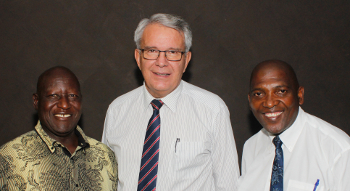Latest News Archive
Please select Category, Year, and then Month to display items
23 June 2023
|
Story Naledi Filita
|
Photo Supplied
 Naledi Filita is an nGAP Lecturer in the Department of Languages in Education.
Naledi Filita is an nGAP Lecturer in the Department of Languages in Education.
The University of the Free State (UFS) is celebrating Youth Month by showcasing the positive influence of the institution on career development. As part of this initiative, we are sharing the stories of UFS alumni who are now working at the university.
Naledi Filita, nGAP Lecturer in the Department of Languages in Education, shares her UFS journey:
Q: Year of graduation from the UFS:
A: 2016, 2018, and 2021.
Q: Qualification obtained from the UFS:
A: Bachelor of Education, Postgraduate Diploma in Education (Curriculum Studies), and Master of Education (Curriculum Studies).
Q: Date of joining the UFS as a staff member:
A: 2021.
Q: Initial job title and current job title:
A: Lecturer.
Q: How did the UFS prepare you for the professional world?
A: I started my career as a teacher in 2015 and was later appointed to my current job. The UFS has equipped me with the knowledge and skills that enabled me to be competent in my field in various contexts. My journey as a UFS student equipped me with crucial skills, such as critical thinking, communication, teamwork, and organisational skills.
Q: What are your thoughts on transitioning from a UFS alumnus to a staff member?
A: It has been a wonderful experience so far. I was once a student teacher at this university. Due to my experiences, being able to instil knowledge and skills in student teachers is something that I am passionate about. I am grateful for the developmental opportunities and support that I receive as a young researcher.
New developments in the Faculty of Theology and Religion
2017-08-30

Bishop JM Khumalo, Apostolic Church of
Christ; Prof Fanie Snyman, Dean of the
Faculty of Theology and Religion; and
Rev Simon Galada, Wesleyan Church,
at the faculty’s official opening in
February 2017.
Photo: Eugene Seegers
At a meeting of the UFS Council last year, a name change was accepted for the Faculty of Theology, renaming it to the Faculty of Theology and Religion. This change signals openness in approach to other religions, in addition to those of Christian denominations. This is a development that took root in Europe a few years ago. Furthermore, a growing field of interest is the study of the impact religion has had and still has, even in highly secularised societies. This name change is the first of its kind in South Africa, which means that the faculty will lead the way in transformation and impact-based religious studies.
Exciting times lie ahead
Prof Fanie Snyman, Dean of the faculty, says of these refinements: “The new name and restructuring of departments will lead to a new synergy that will have an impact on our teaching and research in the faculty. Exciting times lie ahead for the Faculty of Theology and Religion!”
Apart from the change in the name of the faculty, departments within the faculty were also regrouped, with new names. The Departments of Old Testament and New Testament merged to become the Department of Old and New Testament Studies, while the Departments of Systematic Theology and Ecclesiology merged and will now be known as the Department of Historical and Constructive Theology. The former Departments of Practical Theology and Missiology became the Department of Practical and Missional Theology. The Department of Religion Studies remained unchanged to emphasise the importance of religion in South Africa and the world at large.
Error! Hyperlink reference not valid.
Distinction of theological disciplines
The rationale for these groupings is the distinction of theological disciplines in terms of the study of texts (Old and New Testament), sources (Systematic Theology and Church History), and practices (Practical Theology and Missiology). One benefit of these newly-constructed departments is that they will be more cost-effective, but the more important advantage is that this will stimulate discussion and research across the various theological disciplines.